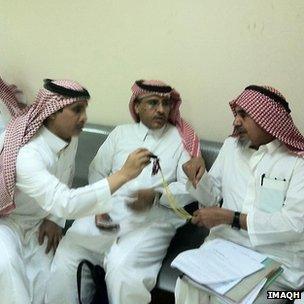Saudi Arabia 'failing to address human rights concerns'
- Published

Amnesty called for the release of activists Mohammad al-Qahtani and Abdullah al-Hamid
Saudi Arabia has failed to act on recommendations by a UN body to improve human rights and instead "ratcheted up" repression, Amnesty International says.
Promises the Gulf Kingdom made to the UN Human Rights Council in 2009 were "nothing but hot air", a report claims, external.
The authorities continue to crack down on activists through "arbitrary arrests and detention, unfair trials, torture and other ill-treatment", it adds.
A Saudi spokesman insisted "tangible progress" had been made.
On Friday, Riyadh refused to take up a non-permanent seat on the UN Security Council, accusing the body of failing in its duties towards Syria, as well as in other conflicts.
'Failure to act'
In its report published on Monday, Amnesty said the kingdom had failed to implement any of the main recommendations from its last Universal Periodic Review by the Human Rights Council.
"Four years ago, Saudi Arabian diplomats came to Geneva and accepted a string of recommendations to improve human rights in the country. Since then, not only have the authorities failed to act, but they have ratcheted up the repression," said Philip Luther, Amnesty's Middle East and North Africa director.
"For all the peaceful activists that have been arbitrary detained, tortured or imprisoned in Saudi Arabia since, the international community has a duty to hold the authorities to account."
Amnesty's report documents what it describes as a "new wave of repression against civil society" that has taken place since 2011.
Human rights activists and supporters of political reform in the country face repressive measures that included arbitrary arrest, detention without charge or trial, unfair trials and travel bans, it says.
In March, two founders of the prominent Saudi Civil and Political Rights Organisation (ACPRA), Abdullah al-Hamid and Mohammed al-Qahtani, were sentenced to 10 and 11 years respectively.
The men, who used Twitter to promote human rights, were found guilty by a court of "breaking allegiance and disobeying the ruler", "undermining unity", "questioning the integrity of officials", "seeking to disrupt security" and "inciting disorder by calling for demonstrations".
"These men are prisoners of conscience who should be released immediately and unconditionally. Their peaceful activism against human rights violations deserves praise not punishment. The only guilty party here is the government," Mr Luther said.
Torture and other ill-treatment during detention is rife and carried out with impunity, the report says. The heavy reliance by the courts on "confessions" often extracted under torture, duress or deception has entrenched such abuses, it claims.
It documents other alleged violations, including "systemic discrimination of women in both law and practice" and "abuse of migrant workers".
The report also accuses the Sunni-ruled kingdom of "discrimination against minority groups", including Shia in Eastern Province, where many have been arrested for taking part in protests to demand greater rights and several have been killed in clashes with security forces.
But at the UN Human Rights Council meeting on Monday, the head of Saudi Arabia's delegation insisted the country's human rights record had improved since 2009.
Bandar bin Mohammed al-Aiban noted that a minimum of 20% of seats on the Shura Council had been allocated to women - the first time they had been able to hold any political office in the kingdom.
"Tangible progress has been achieved on a daily basis," he added.
Mr Aiban, who is the president of the Saudi Human Rights Commission, said the country, which hosts 9 million foreign workers, was also taking all steps needed to protect their rights and provide appropriate conditions.
- Published4 October 2013
- Published28 September 2013
- Published30 July 2013
- Published9 March 2013
- Published7 April 2013